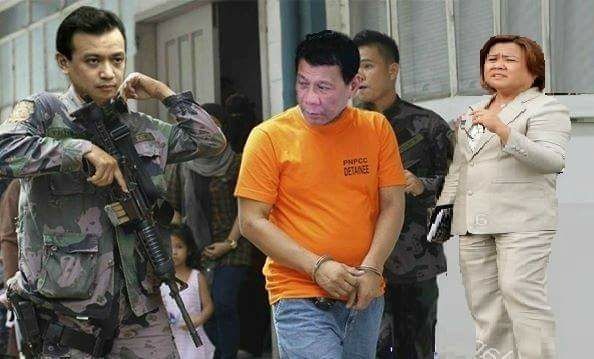
“The ICC can only intervene where a State is unable or unwilling genuinely to carry out the investigation and prosecute the perpetrators.
.
The Rome Statute was adopted by 120 States on 17 July 1998 to establish the International Criminal Court.
.
This is the first time in the history of humankind that States accepted the jurisdiction of a permanent international criminal court for the prosecution of the perpetrators of the most serious crimes committed in their territories or by their nationals after the entry into force of the Rome Statute on 1 July 2002.
.
The International Criminal Court, however, is not a substitute for national courts.
.
According to the Rome Statute, it is the duty of every State to exercise its criminal jurisdiction over those responsible for international crimes.
.
The International Criminal Court can only intervene where a State is unable or unwilling genuinely to carry out the investigation and prosecute the perpetrators.
.
The primary mission of the International Criminal Court is to help put an end to impunity for the perpetrators of the most serious crimes of concern to the international community as a whole, and thus to contribute to the prevention of such crimes.
.
What are the crimes under Article 5 of the Statute of Rome over which the ICC may exercise jurisdiction?
.
The jurisdiction of the ICC shall be limited to the most serious crimes of concern to the international community as a whole.
.
Ads by: Memento Maxima Digital Marketing
@[email protected]
SPACE RESERVE FOR ADVERTISEMENT
The Court has jurisdiction with respect to the following crimes: (a) The crime of genocide which means any of the following acts committed with intent to destroy, in whole or in part, a national, ethnical, racial or religious group. (b) Crimes against humanity which means any of the following acts when committed as part of a widespread or systematic attack directed against any civilian population, with knowledge of the attack. (c) “War crimes” which means grave breaches of the Geneva Conventions of 12 August 1949, namely, any of the following acts against persons or property protected under the provisions of the relevant Geneva Convention and other serious violations of the laws and customs applicable in international armed conflict, within the established framework of international law.
.
Ads by: Memento Maxima Digital Marketing
@[email protected]
SPACE RESERVE FOR ADVERTISEMENT
In the case of an armed conflict not of an international character, serious violations of article 3 common to the four Geneva Conventions of 12 August 1949, namely, any of the following acts committed against persons taking no active part in the hostilities, including members of armed forces who have laid down their arms and those placed hors de combat by sickness, wounds, detention or any other cause.
.
And (d) “Crime of Aggression” which means the planning, preparation, initiation or execution, by a person in a position effectively to exercise control over or to direct the political or military action of a State, of an act of aggression which, by its character, gravity and scale, constitutes a manifest violation of the Charter of the United Nations.
.
Ads by: Memento Maxima Digital Marketing
@[email protected]
SPACE RESERVE FOR ADVERTISEMENT
The Court may exercise its jurisdiction with respect to a crime referred to in article 5 in accordance with the provisions of the Statute if: (a) A situation in which one or more of such crimes appears to have been committed is referred to the Prosecutor by a State Party in accordance with article 14; (b) A situation in which one or more of such crimes appears to have been committed is referred to the Prosecutor by the Security Council acting under Chapter VII of the Charter of the United Nations; or (c) The Prosecutor has initiated an investigation in respect of such a crime in accordance with article 15.What is the role of the Prosecutor under article 15 of the Rome Statute?
.
The Prosecutor may initiate investigations proprio motu on the basis of information on crimes within the jurisdiction of the Court.
.
It analyzes the seriousness of the information received, seeks additional information from States, organs of the United Nations, intergovernmental or nongovernmental organizations, or other reliable sources that he or she deems appropriate, and may receive written or oral testimony at the seat of the Court.
.
And finally, it submits to the Pre-Trial Chamber a request for authorization of an investigation if upon determination there is a reasonable basis to proceed with an investigation.
.
Ads by: Memento Maxima Digital Marketing
@[email protected]
SPACE RESERVE FOR ADVERTISEMENT
.
If the Pre-Trial Chamber should determine that there is a reasonable basis to proceed with an investigation, and that the case appears to fall within the jurisdiction of the Court, it shall authorize the commencement of the investigation.
.
The refusal of the Pre-Trial Chamber to authorize the investigation shall not preclude the presentation of a subsequent request by the Prosecutor based on new facts or evidence regarding the same situation.
.
If, after the preliminary examination, the Prosecutor concludes that the information provided does not constitute a reasonable basis for an investigation, he or she shall inform those who provided the information.
.
This shall not preclude the Prosecutor from considering further information submitted to him or her regarding the same situation in the light of new facts or evidence.
.
A few weeks ago, the Pre-Trial Chamber ordered the Prosecutor to proceed with the formal investigation in the Philippines.
.
How it arrived at this conclusion and what future proceedings would look like will be tackled in the next few columns.
.
Website: tonylavina.com Facebook: deantonylavs Twitter: tonylavs
posted September 28, 2021 at 12:10 am by Tony La Viña
















